What Is Vedic Mathematics? Discover Its Key Benefits
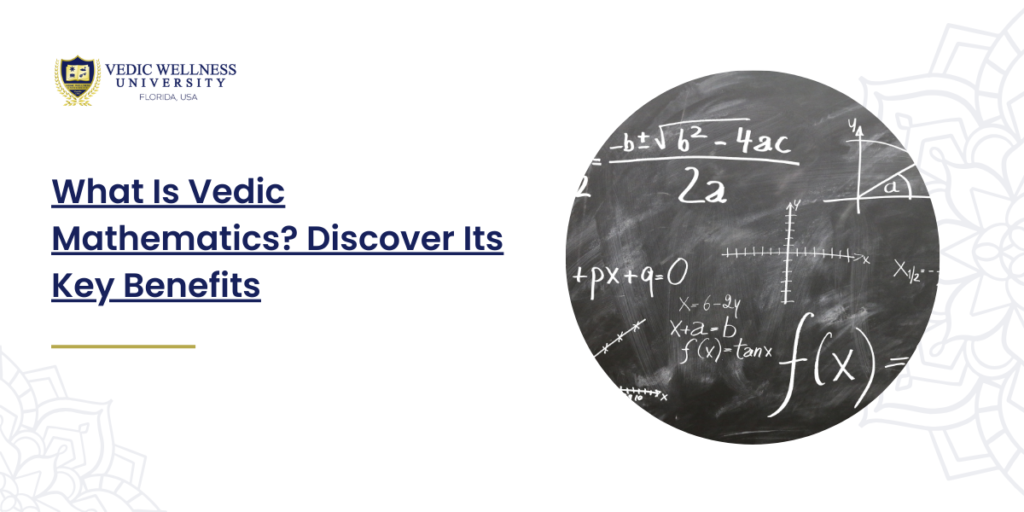
Introduction “सर्वं ज्ञानं मयि विद्यते”(Sarvaṁ Jñānaṁ Mayi Vidyate)“All knowledge is within me.” This ancient shloka from the Rigveda encapsulates the essence of Vedic Mathematics, a system that reveals the inherent knowledge within each individual. Vedic Mathematics, derived from ancient Indian scriptures, is a unique and powerful system of mathematics that simplifies complex calculations through mental arithmetic and intuitive methods. Origins and Timeline of Vedic Mathematics Vedic Mathematics originates from the Vedas, the oldest sacred texts of Hinduism, particularly the Atharva Veda. The system was rediscovered and compiled in the early 20th century by Swami Bharati Krishna Tirthaji, who extracted sixteen sutras (aphorisms) and thirteen sub-sutras from the Vedas, forming the foundation of Vedic Maths. Timeline of Advancements: Prominent Advocates of Vedic Mathematics 1. Swami Bharati Krishna Tirthaji Swami Bharati Krishna Tirthaji is the modern founder of Vedic Mathematics. His work in extracting and compiling the sixteen sutras revolutionized the way mathematics is taught and practiced. 2. Aryabhata An ancient Indian mathematician and astronomer, Aryabhata’s works laid the groundwork for future advancements in mathematics, including concepts that align with Vedic Maths. 3. Bhaskara II Author of “Lilavati” and “Bijaganita,” Bhaskara II’s contributions to algebra and arithmetic are foundational to many principles in Vedic Mathematics. 4. Brahmagupta His text “Brahmasphutasiddhanta” introduced zero and negative numbers, concepts integral to mathematical calculations and Vedic Maths. 5. Ramanujan Although not directly linked to Vedic Maths, the mathematical genius of Srinivasa Ramanujan reflects the intuitive and mental arithmetic prowess that Vedic Mathematics promotes. 6. P.C. Mahalanobis A contemporary statistician who valued traditional Indian methods, Mahalanobis supported the integration of ancient mathematical wisdom with modern practices. 7. Shakuntala Devi Known as the “Human Computer,” Shakuntala Devi’s mental arithmetic abilities are a testament to the power of intuitive calculation methods similar to those in Vedic Maths. 8. Dr. Manjul Bhargava A modern mathematician whose work in number theory resonates with the principles of Vedic Mathematics, promoting mental calculations and simplicity. 9. D.R. Kaprekar Famous for discovering Kaprekar’s constant, his work in recreational mathematics aligns with the playful and exploratory nature of Vedic Maths. 10. T.V. Seshadri An advocate of Vedic Mathematics, T.V. Seshadri worked extensively to promote and teach the system, emphasizing its practical applications in modern education. Scope of Vedic Mathematics Vedic Mathematics offers vast potential in various fields, providing numerous career opportunities. Professionals proficient in Vedic Maths can pursue careers as educators, researchers, data analysts, financial analysts, and software developers. Here are some potential career paths and their expected remunerations: Courses in Vedic Mathematics Vedic Wellness University offers a range of courses focused on Vedic Mathematics, designed to cater to different levels of expertise and interest. These courses include: These courses combine traditional Vedic wisdom with modern educational practices, providing students with a holistic understanding of mathematics and its applications. Conclusion “आ नो भद्राः क्रतवो यन्तु विश्वतः”(ā no bhadrāḥ kratavo yantu viśvataḥ)“Let noble thoughts come to us from every side.” Vedic Mathematics is not just an ancient system but a revolutionary approach to simplifying mathematical calculations and fostering mental agility. Its principles are timeless, offering significant benefits in education, professional fields, and everyday life. Vedic Wellness University is dedicated to preserving and promoting this ancient knowledge, integrating it with contemporary relevance to empower individuals worldwide. Embrace the wisdom of Vedic Maths and discover the profound impact it can have on your intellectual and professional growth.
Best Method of Learning Vedic Maths
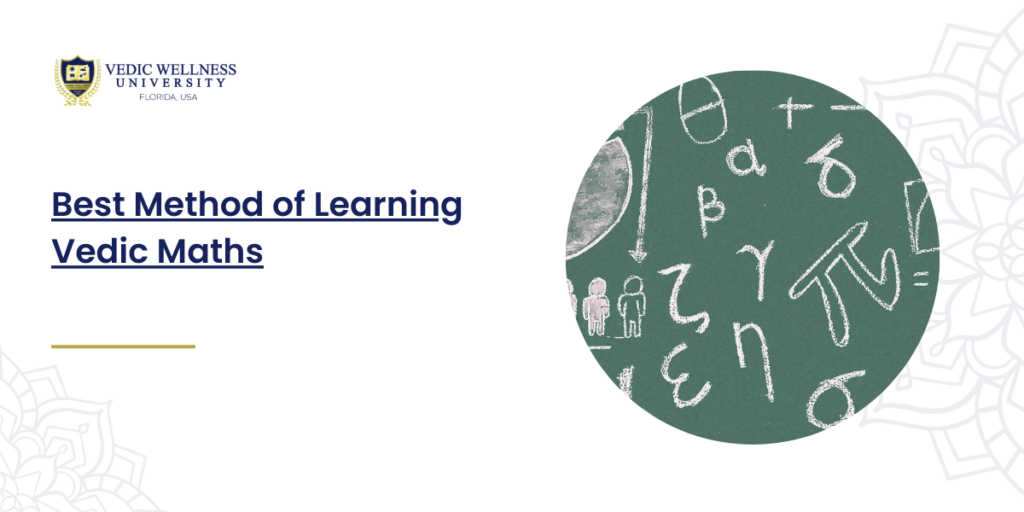
Introduction to Vedic Mathematics “सत्यं ज्ञानमनन्तं ब्रह्म”(satyam jñānam anantam brahma)“Truth, knowledge, and infinity are Brahman.” Vedic Maths is an ancient Indian system of mathematics that originated from the Vedas, specifically the Atharva Veda. It was rediscovered in the early 20th century by Sri Bharati Krishna Tirthaji, who compiled it into a system of 16 sutras (aphorisms) and 13 sub-sutras. These sutras encompass various mathematical operations and problem-solving techniques that make calculations simpler and faster. Vedic Mathematics was traditionally taught through oral transmission and manuscripts, emphasizing mental calculations and intuitive understanding. Importance of Vedic Mathematics in Modern Day In today’s fast-paced world, the ability to perform quick and accurate calculations is invaluable. Vedic Mathematics offers a significant advantage to students preparing for competitive exams like CAT, GMAT, and GRE, where speed and accuracy in solving mathematical problems are crucial. Beyond academic exams, Vedic Mathematics is also beneficial in everyday life, enhancing one’s ability to perform mental arithmetic and problem-solving with ease. Common Uses of Vedic Mathematics in Modern Day 1. Quick Calculations Vedic Mathematics simplifies complex calculations, enabling quick mental arithmetic. This is particularly useful in competitive exams where time is limited, allowing students to solve problems faster and more accurately. 2. Cross-Checking Answers Vedic Mathematics provides methods for verifying answers quickly. Techniques like the digital root method help in cross-checking answers, ensuring accuracy in calculations, which is particularly useful in examinations and professional settings. 3. Enhancing Cognitive Skills Learning Vedic Maths enhances cognitive abilities such as memory, concentration, and analytical thinking. These skills are beneficial not only in academics but also in professional and personal life. 4. Simplifying Algebraic Calculations Vedic Mathematics offers straightforward methods for solving algebraic equations. Techniques such as the Vertically and Crosswise method simplify multiplication and division of algebraic expressions, making it easier for students to understand and solve algebraic problems. 5. Boosting Confidence in Mathematics The ease and speed of calculations provided by Vedic Maths boost students’ confidence in their mathematical abilities. This confidence translates into better performance in exams and a more positive attitude towards learning mathematics. 6. Applications in Various Fields Vedic Mathematics finds applications in various fields such as engineering, computer science, and finance. The methods and techniques can be used to simplify complex calculations, optimize algorithms, and enhance computational efficiency. Scientific Applications of Vedic Mathematics As we look towards the future, the principles of Vedic Mathematics hold potential for various scientific applications. Here are five models that could be developed using Vedic mathematical principles: 1. Optimized Algorithm Design Vedic Mathematics can inspire the development of optimized algorithms for computational tasks. Techniques such as the Vertically and Crosswise method can be adapted to create faster and more efficient algorithms for data processing and analysis. 2. Cryptographic Systems The simplicity and speed of Vedic mathematical calculations can be utilized to develop robust cryptographic systems. These systems can enhance data security by using complex mathematical operations that are quick to compute but difficult to break. 3. Quantum Computing Models Quantum computing, which relies on principles of superposition and entanglement, could benefit from the intuitive and efficient methods of Vedic Mathematics. Developing quantum algorithms based on Vedic principles could lead to breakthroughs in computational speed and efficiency. 4. AI and Machine Learning Artificial Intelligence (AI) and Machine Learning (ML) models require extensive calculations and optimizations. Vedic Mathematics can contribute to developing more efficient algorithms for training and deploying AI/ML models, improving their performance and reducing computational costs. 5. Financial Modelling In finance, Vedic Mathematics can aid in the development of models for risk assessment, investment strategies, and market predictions. The quick and accurate calculation methods can enhance the precision and reliability of financial models. Conclusion Vedic Mathematics is a timeless system that bridges ancient wisdom with modern needs. Its principles offer quick and efficient methods for mathematical calculations, making it invaluable for students, professionals, and researchers alike. As we continue to explore its applications, Vedic Mathematics holds the potential to revolutionize various scientific and technological fields. The future of Vedic Mathematics is promising, with endless possibilities for innovation and discovery. “आ नो भद्राः क्रतवो यन्तु विश्वतः”(ā no bhadrāḥ kratavo yantu viśvataḥ)“Let noble thoughts come to us from every side.” Embracing the holistic approach of Vedic Mathematics can lead to a better understanding of the universe, fostering growth and enlightenment in every aspect of life.
Learning Vedic Astrology Step By Step For Beginners
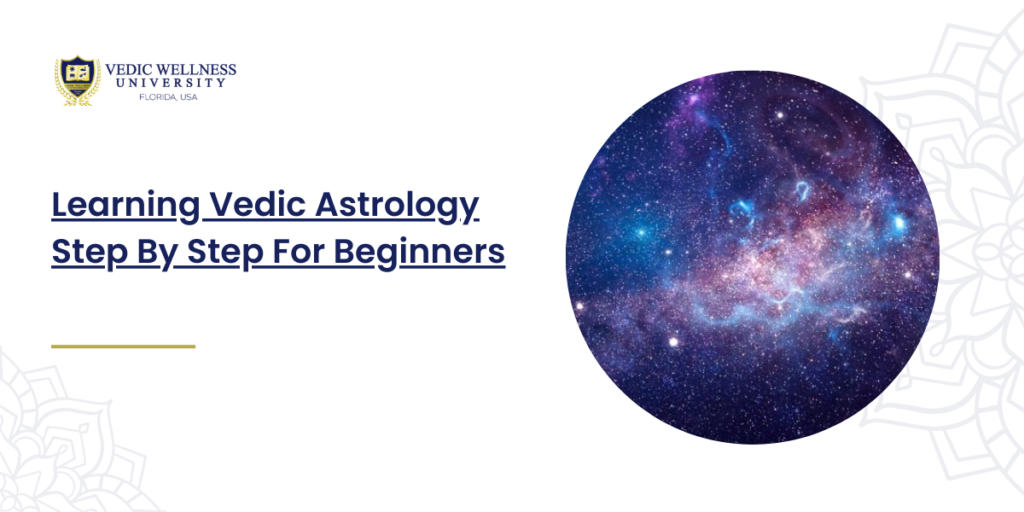
Introduction “सर्वं ज्ञानं मयि विद्यते”(sarvaṁ jñānaṁ mayi vidyate)“All knowledge is within me.” Vedic astrology, known as Jyotish Shastra, is an ancient science rooted in the Vedas, the oldest sacred texts of Hinduism. The origins of Vedic astrology can be traced back to the Rigveda, around 1500 BCE, where celestial bodies were observed and their influence on human life was recorded. Over millennia, Vedic astrology has evolved, incorporating advancements in astronomy and blending seamlessly with modern scientific principles. This holistic approach has made learning Vedic astrology a fascinating journey for enthusiasts worldwide. Origins and Evolution of Vedic Astrology The earliest known mention of Vedic astrology is found in the Rigveda, which documents the alignment of planets and stars with human destiny. The science was further refined by ancient scholars who wrote extensive texts on the subject, such as “Brihat Samhita” by Varahamihira and “Brihat Parashara Hora Shastra” by Parashara. These texts laid the foundation for the systematic study of astrology, including the development of various branches such as natal astrology, electional astrology, and mundane astrology. As time progressed, Vedic astrology integrated mathematical precision with spiritual insights, making it a comprehensive tool for understanding life’s complexities. Today, Vedic astrology is recognized for its accuracy and depth, offering insights that align with contemporary scientific discoveries. Notable Indian Scholars in Vedic Astrology 1. Varahamihira Varahamihira was a renowned scholar and author of “Brihat Samhita,” a classical text that covers various aspects of astrology, astronomy, and weather prediction. 2. Parashara Parashara is credited with writing “Brihat Parashara Hora Shastra,” a fundamental text that forms the backbone of Vedic astrology. His work is still widely studied and respected. 3. Aryabhata Aryabhata was a mathematician and astronomer whose work, “Aryabhatiya,” includes significant contributions to astrology and astronomy, especially in calculating planetary positions. 4. Bhrigu Bhrigu, one of the seven great sages, authored the “Bhrigu Samhita,” a comprehensive astrological classic that provides detailed predictions and analyses based on individual horoscopes. 5. Kalyana Varma Kalyana Varma wrote “Saravali,” a key text in Vedic astrology that offers detailed explanations of astrological principles and their applications. Modern Day Applications of Vedic Astrology 1. Personal Life Guidance Learning Vedic astrology can provide deep insights into personal lives, helping individuals understand their strengths, weaknesses, and life purpose. By analyzing birth charts, astrologers can offer personalized advice on various life aspects. 2. Career Counseling Astrology can guide individuals in choosing careers that align with their inherent skills and planetary influences. This alignment can lead to greater job satisfaction and professional success. 3. Relationship Compatibility Vedic astrology is often used to analyze compatibility between partners, aiding in the selection of harmonious and fulfilling relationships. This practice is commonly used in marriage arrangements in India. 4. Health Predictions Astrological charts can indicate potential health issues and guide individuals towards preventive measures and holistic healing practices. This approach helps in maintaining overall well-being. 5. Financial Planning Astrological insights can assist in making informed financial decisions, identifying auspicious times for investments and business ventures. This guidance can lead to better financial stability and growth. 6. Spiritual Growth Astrology aids in understanding one’s spiritual path and karmic influences, promoting spiritual growth and self-awareness. It helps individuals align their actions with their spiritual goals. 7. Electional Astrology Choosing the most auspicious times (Muhurta) for important events such as marriages, business launches, and other significant undertakings can ensure success and harmony. 8. Education and Learning Guidance on the best times to start educational pursuits and the most suitable fields of study based on individual charts can enhance learning experiences and outcomes. 9. Remedial Measures Vedic astrology suggests remedies like gemstones, mantras, and rituals to mitigate negative planetary influences and enhance positive ones. These measures can improve life circumstances. 10. Psychological Insights Astrology offers insights into one’s psychological makeup, aiding in personal development and emotional well-being. It helps individuals understand and manage their emotions better. Career Opportunities in Vedic Astrology 1. Astrologer Requires at least a diploma in Vedic astrology. Astrologers provide consultations, and their remuneration can range from ₹50,000 to ₹2,00,000 per month depending on their clientele and reputation. 2. Astrological Writer/Author A degree in Vedic studies or astrology is beneficial. Authors write books, articles, and blogs. Earnings vary widely, from ₹30,000 to ₹1,50,000 per month. 3. Researcher Requires a PhD in Vedic astrology or related fields. Researchers work in academic institutions or independently, with potential earnings ranging from ₹60,000 to ₹1,50,000 per month. 4. Astrological Software Developer A background in IT along with knowledge of astrology. Developers create astrological software and apps, with salaries starting from ₹70,000 per month. 5. Vedic Astrology Teacher Requires at least a graduate degree in Vedic astrology. Teachers educate students at universities or online platforms, earning between ₹40,000 to ₹1,00,000 per month. Step by Step Guide to Becoming a Scholar in Vedic Astrology 1. Understanding the Basics Start by learning the fundamentals of Vedic astrology, including the significance of planets, houses, and zodiac signs. Read introductory books and take online courses to build a solid foundation. 2. Formal Education Enroll in a diploma or degree program in Vedic astrology at a recognized institution like Vedic Wellness University. These programs provide structured learning and comprehensive knowledge, covering various aspects of astrology. 3. Practice and Application Practice by reading charts and offering free consultations to friends and family. This hands-on experience is crucial for honing your skills and gaining practical insights into astrological interpretations. 4. Advanced Studies Pursue advanced courses or a master’s degree to deepen your understanding of complex astrological concepts and techniques. Specialized courses in areas like medical astrology or financial astrology can enhance your expertise. 5. Research and Specialization Specialize in a particular area such as medical astrology, financial astrology, or relationship astrology. Conduct research and contribute to the field by publishing papers and books, establishing yourself as an expert. Conclusion The scope of Vedic astrology is vast and continually expanding. With its profound insights and practical applications, it offers valuable guidance in various aspects of life. As more people seek deeper understanding
Herbal Remedies in Ayurveda: Natural Solutions for Common Ailments
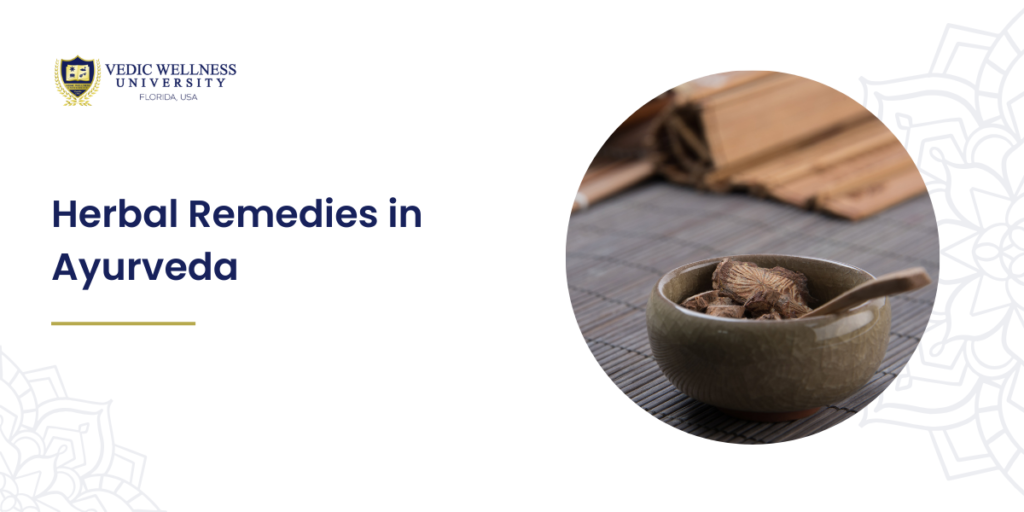
Ayurveda, the ancient system of medicine from India, has long emphasized the healing power of herbs. At Vedic Wellness University, we integrate traditional Vedic knowledge with modern practices to provide a holistic education in natural health solutions. This blog explores the benefits of herbal remedies in Ayurveda and their effectiveness in treating common ailments. The Foundations of Ayurveda Ayurveda, which translates to “the science of life,” is based on balancing the body, mind, and spirit. It categorizes individuals into three doshas: Vata, Pitta, and Kapha. Imbalance in these doshas leads to illness, and Ayurvedic treatments, including herbal remedies, aim to restore this balance. “Swasthasya swasthya rakshanam aturasya vikar prashamanam cha”(To protect the health of the healthy and to alleviate the disorders of the sick.)– Charaka Samhita Benefits of Herbal Remedies in Ayurveda Herbal remedies in Ayurveda are derived from plants and natural substances, offering a safe and effective way to treat various health conditions. These remedies are known for their minimal side effects and holistic approach to healing. Common Ailments and Ayurvedic Solutions 1. Digestive Issues Digestive problems like indigestion, bloating, and constipation are common. Ayurveda recommends herbs such as ginger, fennel, and Triphala to improve digestion and relieve discomfort. “Aharaparinam karanam jeernam pachan sevanat”(Food is digested and assimilated due to the action of digestive enzymes.)– Sushruta Samhita 2. Respiratory Conditions Herbs like Tulsi (Holy Basil), Licorice, and Turmeric are effective in treating respiratory issues such as asthma, bronchitis, and cough. Tulsi, known for its anti-inflammatory and antibacterial properties, is especially beneficial. 3. Skin Disorders Ayurvedic herbs such as Neem, Aloe Vera, and Turmeric are widely used to treat skin conditions like acne, eczema, and psoriasis. These herbs possess anti-inflammatory, antimicrobial, and healing properties. Integrating Herbal Remedies into Daily Life Incorporating herbal remedies into your daily routine can promote overall health and prevent illnesses. Simple practices like drinking herbal teas, using herbal supplements, and applying herbal oils can make a significant difference. 4. Stress and Anxiety Ashwagandha and Brahmi are potent herbs used in Ayurveda to combat stress and anxiety. These adaptogenic herbs help regulate the body’s stress response and promote mental clarity and relaxation. “Prasanna atma indriya manah swastha iti abhidhiyate”(Health is a state of complete physical, mental, and social well-being.)– Sushruta Samhita Global Acceptance and Research The efficacy of herbal remedies in Ayurveda is increasingly recognized worldwide. Research studies have validated the benefits of Ayurvedic herbs, leading to their integration into modern healthcare systems. Countries such as the USA, Canada, and Australia have seen a rise in the popularity of Ayurvedic treatments. Learning Ayurveda at Vedic Wellness University Vedic Wellness University offers a comprehensive curriculum in Ayurveda, including the study of herbal remedies. Our programs are designed to provide students with in-depth knowledge and practical skills to apply Ayurvedic principles in their lives and careers. Conclusion Herbal remedies in Ayurveda offer natural and effective solutions for common ailments, emphasizing the importance of balance and holistic health. At Vedic Wellness University, we are committed to preserving and promoting this ancient wisdom, integrating it with modern practices to provide a comprehensive education in natural health. Embrace the healing power of Ayurveda and discover the benefits of herbal remedies for yourself. For those interested in exploring this ancient science, Vedic Wellness University provides the ideal platform to learn and grow. Join us and discover the profound impact of Ayurveda on your health and well-being.
The Relevance of Vedic Teachings in Modern Times: A Course on Vedas Perspective
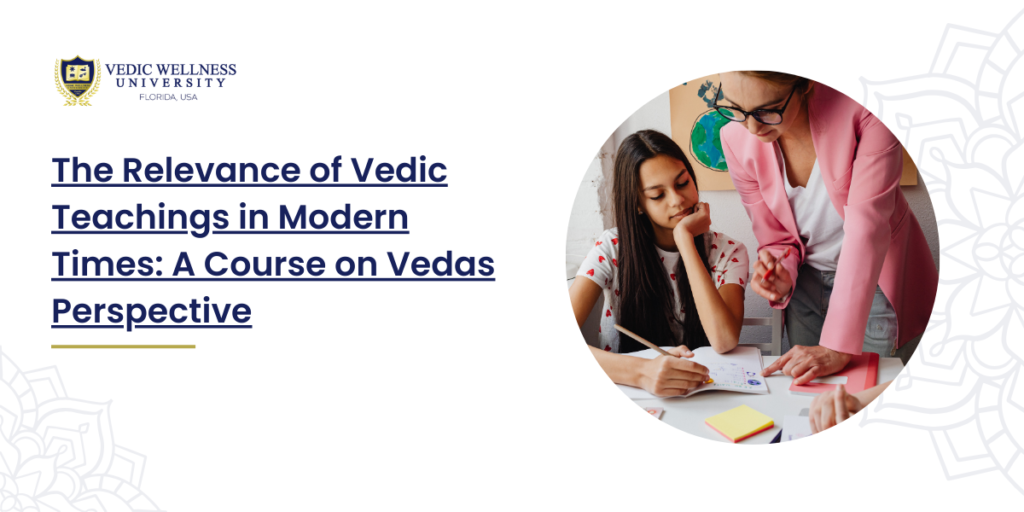
In an era characterized by rapid technological advancements and societal changes, the ancient wisdom encapsulated in the Vedas offers timeless insights that remain profoundly relevant. Vedic Wellness University, through its diverse academic offerings, integrates these ancient teachings with contemporary practices, underscoring their enduring significance. Our course on Vedas provides a deep dive into this ancient wisdom, exploring its applicability in modern life. Understanding Vedic Teachings | Course on Vedas The Vedas, a collection of ancient Indian scriptures, form the foundation of Vedic philosophy. These texts encompass a wide range of knowledge, from metaphysical and spiritual insights to practical guidelines on living a harmonious and balanced life. The Vedas are divided into four main texts: Rigveda, Yajurveda, Samaveda, and Atharvaveda, each with its unique focus and teachings. “Ekam sat vipra bahudha vadanti”(Truth is one; the wise call it by many names.)– Rigveda 1.164.46 Key Concepts in Vedic Teachings 1. Dharma (Righteous Duty) Dharma refers to the moral and ethical duties that guide an individual’s actions. In modern times, understanding and practicing Dharma can help individuals navigate ethical dilemmas and contribute positively to society. Our course on Vedas delves into the principles of Dharma, providing practical applications for contemporary issues. 2. Karma (Action and Consequence) Karma, the law of cause and effect, emphasizes that every action has consequences. This concept encourages individuals to act with mindfulness and responsibility. By studying Karma in the course on Vedas, students learn to make conscious choices that lead to personal and collective well-being. “Karmanye vadhikaraste ma phaleshu kadachana”(You have a right to perform your prescribed duties, but you are not entitled to the fruits of your actions.)– Bhagavad Gita 2.47 Vedic Teachings and Modern Science There are striking parallels between Vedic philosophy and modern scientific discoveries, particularly in areas such as quantum physics and consciousness studies. The Vedas’ emphasis on the interconnectedness of all life and the cyclical nature of the universe resonates with contemporary scientific understandings. 3. Mind-Body Connection Vedic teachings highlight the intricate connection between the mind and body, a concept increasingly recognized in modern medicine. Practices like yoga and meditation, rooted in the Vedas, are now widely adopted for their mental and physical health benefits. Our course on Vedas includes practical sessions on these techniques, demonstrating their relevance in today’s health practices. Environmental Sustainability The Vedas advocate for living in harmony with nature, promoting sustainability and respect for all forms of life. These principles are crucial in addressing contemporary environmental challenges. By studying the Vedas, students learn sustainable living practices that can be applied to modern environmental initiatives. “Vasudhaiva Kutumbakam”(The world is one family.)– Maha Upanishad 6.72 Ethical Leadership and Governance Vedic teachings on leadership and governance offer valuable insights for modern leaders. The emphasis on ethical conduct, responsibility, and servant leadership can help in building just and effective governance systems. Our course on Vedas includes modules on leadership, drawing lessons from ancient texts for contemporary application. Global Relevance and Application The universal principles found in Vedic teachings transcend cultural and geographical boundaries. Their application in areas such as ethical leadership, environmental sustainability, and personal well-being makes them relevant across the globe. Vedic Wellness University’s course on Vedas attracts international students, fostering a global understanding and appreciation of these ancient teachings. Conclusion Vedic teachings offer timeless wisdom that is highly relevant in modern times. Their principles on Dharma, Karma, mind-body connection, and sustainable living provide valuable guidance for contemporary challenges. At Vedic Wellness University, our course on Vedas integrates this ancient knowledge with modern practices, providing a comprehensive education that is both practical and profound. Embrace the wisdom of the Vedas and explore their relevance in your life and beyond. For those interested in delving deeper into Vedic wisdom, Vedic Wellness University offers the ideal platform to learn and grow. Join us and discover the transformative power of Vedic teachings for a fulfilling and enlightened life.

